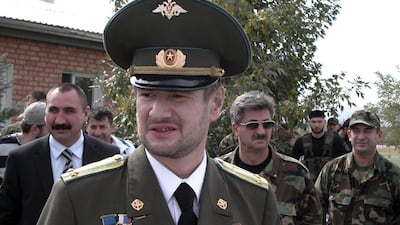ISTANBUL // The trial of three men accused of killing Chechens in Turkey on orders from Moscow could help shed light on the 2009 murder of a former warlord in Dubai.
Temur Makhauri will appear in an Istanbul court on Monday accused of assassinating the Chechen militant Ali Osaev in Istanbul in the same year.
The two other defendants, Alexander Zharkov and Nadim Ayupov, who the prosecution says worked for the Russian intelligence service FSB, are believed to have fled the country. Mr Zharkov and Mr Ayupov are also accused of killing three other Chechens in Istanbul in 2011.
The assassinations were part of a wave of killings of prominent Chechen separatists both in Russia and abroad after the conflicts between Moscow and Chechen rebels in the Caucasus region in the 1990s and early 2000s.
Among those assassinated was Sulim Yamadayev in the car park of Dubai’s Jumeirah Beach Residence in March 2009.
Dubai police said the murder was planned by Adam Delimkhanov, the former deputy prime minister of Chechnya and a current Russian member of the state parliament. He is accused of providing the murder weapon — a gold-plated Makarov PM 9mm handgun.
Two men were jailed for aiding and abetting the killers but police are still searching for seven people in connection with the murder of Yamadayev, who had survived 19 attempts on his life before moving to the Emirates in 2009.
Yamadayev was killed just weeks after Osaev was gunned down in Istanbul and the trial of his killers might unearth new clues to the Dubai slaying, said Orkhan Gafarli, an analyst at Bilgesam, an Istanbul-based think tank.
“We may learn further details in the course of the trial that could give us more certainty to say what happened in Dubai,” Mr Gafarli said last week.
The Istanbul prosecutor Ahmet Demirhuyuk accuses Russia of “waging war” on Chechen groups in Turkey.
Osaev was the Istanbul representative of the Caucasus Emirate, a group seen as a terrorist organisation by both Russia and the United States.
Turkey, a country where up to five million of 75 million people trace their roots to the Caucasus, has dozens of associations of Chechens and Circassians, where sympathies for anti-Russian rebels is high.
Mr Makhauri, the man accused of Osaev’s murder, met Russian agents shortly before his arrest in 2012, news reports said. The prosecution says those talks focused on plans for other assassinations.
Prosecutors are asking for the maximum sentence — life — for all three defendants.
Members of Chechen and Circassian groups in Turkey say Moscow has been intimidating and threatening them for years. Some of the members have been granted police protection by Turkey.
Murat Ozer, head of Imkander, a group that supports refugees from the Caucasus in Turkey and that is critical of Russian politics in the region, said the prosecution’s findings in the Istanbul murders marked the first time the Turkish judiciary had officially implicated the Russian state in the death of Chechens in Turkey.
Mr Ozer said the trial would produce “extremely startling information about assassinations directed against leaders of the Caucasian resistance both at home and abroad”.
The accusation that Moscow’s intelligence service is hunting Chechen rebels in other countries has been around for at least a decade. In 2004, a court in Qatar sentenced two Russian intelligence agents to life in prison for assassinating Zelimkan Yandarviyev, a Chechen rebel leader. Russia said the two men were innocent.
Mr Gafarli, the analyst, said tensions between different Chechen groups were also a possible reason for the killings in Istanbul.
“At the moment, we do not have enough evidence to say whether Russia or rivalry between Chechens was the cause” for the murders, he said. “If the trial in Istanbul concludes that the murder was the work of Russian agents, we may be in a better position to say Dubai was the same.”
But Ankara was unlikely to put its ties with Moscow at risk over the murders, given Russia’s key role as an energy supplier, Mr Gafarli said.
“There may be some tensions between the governments, but the relations will not be shaken to their core,” he said.
foreign.desk@thenational.ae

